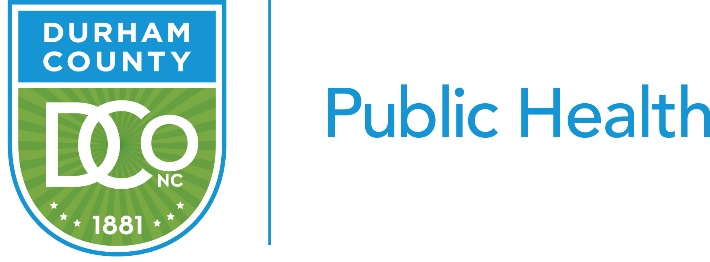

|
FOR IMMEDIATE RELEASE
November 30, 2015
|
|
| Contact(s): |
|
|
Eric Nickens, Jr.
Communications and Public Relations Manager
(919) 560-7624 office / (919) 309-6092 cell
enickens@dconc.gov
|
Arlene Seña, MD, MPH
Medical Director
(919) 560-7640
asena@dconc.gov
|
DURHAM, NC – Persons at high risk (for example, partner of a person with HIV), now have the option of taking a pill once a day to greatly reduce their risk of becoming infected with the virus, in addition to using other preventive methods such as condoms.
Pre-exposure prophylaxis, or PrEP, is a new tool for HIV prevention being promoted by the Durham County Department of Public Health and other local healthcare providers.
Durham County had one of the highest rates of newly diagnosed HIV infection in North Carolina in 2014. In response, the Department implemented a program in their Adult Health Clinic, which provides PrEP counseling, baseline screening for HIV and other sexually transmitted infections, and referral to PrEP prescribing providers.
Since May 2015, the Department has provided referrals for over 50 patients to healthcare providers at Lincoln Community Health Center and the infectious diseases clinics at Duke University and UNC-Chapel Hill – all of whom prescribe PrEP.
“We need to work together to provide PrEP,” says Dr. Arlene Seña, medical director for the Durham County Department of Public Health. “This is especially challenging for our uninsured patients, but we are actively working with other community organizations and partners in HIV prevention to improve access to PrEP.”
Strong research evidence indicates that PrEP, when used consistently, is safe and effective for reducing the risk of acquiring HIV sexually. The combination pill (which contains the drugs tenofovir and emtricitabine) was approved for use as for PrEP in July 2012. However, many high risk patients are still unaware of this prevention method, and how they can get PrEP through a healthcare provider.
Since 2014, the North Carolina AIDS Training and Education Center (NCATEC) has worked to expand access to PrEP by educating healthcare providers about this important advance in prevention.
“We started with three clinics and now have a statewide network of over 35 sites providing PrEP services,” said Christopher Hurt, MD, an infectious diseases physician at UNC-Chapel Hill who has directed NCATEC’s efforts on PrEP expansion.
“We have online resources for providers interested in PrEP, those prescribing it, and for potential patients who might have questions.”
The Duke University Division of Infectious Diseases will be starting a dedicated PrEP clinic in 2016, and plans to expand education and community outreach for high risk patients in the area.
For more information regarding PrEP and a map of statewide providers prescribing PrEP, visit the NCATEC website at https://www.med.unc.edu/ncaidstraining/prep/PrEP-for-consumers.
For more information about the services offered by the Durham County Department of Public Health’s Adult Health Clinic, call 919-560-7600.
# # #